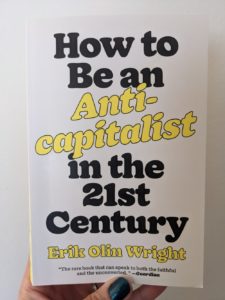How to Be an Anticapitalist in the 21st Century by Erik Olin Wright
Written by Ashley Kelmore, Posted in Reviews
Best for:
Anyone looking for an easy-to-digest outline of the options we have for moving society away from capitalism.
In a nutshell:
In six short but packed chapters, author Wright explores the problems of capitalism, the various ways of fighting it, and what is needed to accomplish that.
Worth quoting:
“The claim that capitalism harms democracy and freedom is more complex than simply proposing that capitalism is opposed to freedom and democracy. Rather, the logic is that capitalism generates severe deficits in realizing the values of democracy and freedom. Capitalism promotes the emergency and partial development of both freedom and democracy, but it obstructs the fullest possible realization of these values.”
Why I chose it:
I think I bought this nearly a year ago when Verso books was having a big sale. It looked interesting.
What it left me feeling:
Discouraged, despite the author’s best efforts.
Review:
I found this book to be really well done. I appreciate shorter books like this one (150 pages) that don’t try to fit the entire history of humanity into its pages. Instead, author Wright breaks this book into six easy to understand chapters: why be anti-capitalist?; diagnosis and critique of capitalism; varieties of anticapitalism, the destination beyond capitalism – socialism as economic democracy; anticapitalism and the state, and agents of transformation.
The author is not calling for a revolution, not is he suggesting we burn everything down and start from scratch. My guess from reading up on the author is this because of pragmatism — if an actual, successful, all-out revolution were possible without harming loads of the people already harmed by capitalism, my thinking is he’d support that. Instead he looks at the different ways we can approach essentially gnawing away at capitalism from above and below.
He starts by laying out his foundations for the values that society should hold dear: equality/fairness; democracy/freedom; and community/solidarity. He then talks about how capitalism is really not great for any of these things (I think some people who claim capitalism nearly equal to freedom and democracy would benefit from reading this section). The third chapter focuses on the five ways he posits we can be anticapitalist: smash capitalism, dismantle capitalism, tame capitalism, resist capitalism, and erode it. Some aspects he notes are already in play, usually when things we might associate with socialism are implemented to fix problems caused by socialism. Those five ways are a mix of from above and from below, which provides for some variety.
The fourth chapter I found to be quite interesting because it was a short glimpse into his idea of what socialism could look like if implemented, including unconditional basic income, cooperative market economies, and democratizing capitalist firms (along with other suggestion). Chapter five looks at all the challenges we face with the state as it stands now; the final chapter talks somewhat about how to harness collective action.
I’ve said the book has left be discouraged because I think about the politics of the two countries I know best: the US and the UK. In the US, even as little children are murdered by guns in their schools, politicians only care about prevent drag performers from reading books to kids, and making sure that anyone who does get pregnant is forced to stay pregnant. And all the gerrymandering (which Wright does reference a couple of times) is allowing the minority political groups (far-right Republicans) to be in control of state houses. And in the UK, for some reason people who like to call themselves feminists are obsessed with the genitalia of people in restrooms to the point where they are putting the rights and lives of trans people at risk, often led by their anti-trans queen JK Rowling. (I know the US is horrible on trans issues as well; it’s just wild seeing how it is playing out here in the UK). The UK is also vile in its treatment of immigrants and asylum seekers. Just really invested in fiurther harming those who are already in horrible situations. Meanwhile neither place is doing nearly enough to address climate change, or the cost of living scandal, or racism, sexism, anti-trans hate, religious bigotry, poverty.
So I have a hard time thinking that the state can ever be changed. I know that’s silly and defeatist, and I’m not just giving up on thinking something better is possible. But so many people are so deeply invested in maintaining their own power and so invested in harming anyone who isn’t like them that I have a hard time seeing them willingly take any sort of action that will reduce their power or frankly help anyone who doesn’t look like them.
Recommend to a Friend / Keep / Donate it / Toss it:
Keep

